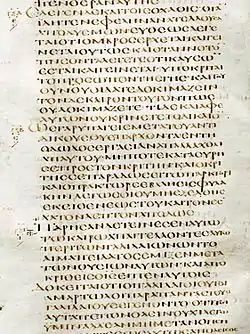Luke 12
Luke 12 is the twelfth chapter of the Gospel of Luke in the New Testament of the Christian Bible. It records a number of teachings and parables told by Jesus Christ when "an innumerable multitude of people had gathered together", but addressed "first of all" to his disciples.[1][2] The book containing this chapter is anonymous, but early Christian tradition uniformly affirmed that Luke composed this Gospel as well as the Acts of the Apostles.[3]
| Luke 12 | |
|---|---|
.jpg.webp) Fragment of Uncial 0191, 6th century bilingual Greek-Coptic manuscript of the Gospels with text of Luke 11:51-12:5 | |
| Book | Gospel of Luke |
| Category | Gospel |
| Christian Bible part | New Testament |
| Order in the Christian part | 3 |
Text

The original text was written in Koine Greek. This chapter is divided into 59 verses.
Textual witnesses
Some early manuscripts containing the text of this chapter are:
- Papyrus 75 (AD 175-225)
- Papyrus 45 (~250)
- Codex Vaticanus (325-350)
- Codex Sinaiticus (330-360)
- Codex Bezae (~400)
- Codex Washingtonianus (~400)
- Codex Alexandrinus (400-440)
- Codex Ephraemi Rescriptus (~450; extant verses 1-3)
An innumerable multitude
- In the meantime, when an innumerable multitude of people had gathered together so that they trampled one another, He began to say to His disciples first of all, “Beware of the leaven of the Pharisees, which is hypocrisy. [1]
Scottish minister William Robertson Nicoll suggests this is "the largest crowd mentioned anywhere in the Gospels" [4] but Jesus speaks "first of all" to his disciples,[1] only turning to the multitude in verses 14-21, in response to a question from someone in the crowd, and again in verses 54-59. Peter asks (at verse 41) whether the parable of the faithful servant is addressed solely to the disciples or to the wider multitude (παντας, pantas: everyone).[5]
The Jerusalem Bible notes that an alternative reading would connect the word "first" with the succeeding statement: First of all, be on your guard ... (Greek: πρωτον προσεχετε εαυτοις, proton prosechete eautois).[6] Protestant commentator Heinrich Meyer likewise argues that "πρῶτον, before all, is to be taken with προσέχετε"; it does not belong to what precedes".[7]
Nicoll calls this passage (verses 1-12) an "exhortation to fearless utterance".[4]
Parable of the Rich Fool

Among the canonical gospels of the New Testament, this parable of Jesus appears only in Luke's Gospel. The parable reflects the foolishness of attaching too much importance to wealth. It is introduced by a member of the crowd listening to Jesus, who tries to enlist Jesus' help in a family financial dispute:[10]
- One of the multitude said to him, "Teacher, tell my brother to divide the inheritance with me.[11]
J. B. Lightfoot, Kuinoel (de:Christian Gottlieb Kühnöl), and others note and emphasise that he was "certainly no attendant of Jesus".[7] Meyer observes that he was "a Jew on whom the endowments and authority of Jesus produced such an impression that he thought he might be able to make use of Him in the matter of his inheritance", but considers that "whether he was a younger brother who grudged to the first-born his double share of the inheritance ... must be left in doubt".[7][12]
An abbreviated version of the parable appears in the non-canonical Gospel of Thomas (Saying 63).[13]
The parable has been depicted by artists such as Rembrandt (illustrated), Jan Luyken, James Tissot, and David Teniers the Younger.
Do Not Worry
Seek the kingdom of God
Verse 31
- But rather seek ye the kingdom of God; and all these things shall be added unto you.[14]
Similarly in Matthew 6:33, with a slightly longer text: Seek ye first the kingdom of God, and his righteousness; and all these things shall be added unto you.[15]
Verse 34
- For where your treasure is, there will your heart be also.[16]
Cross reference: Matthew 6:21 In the book "Harry Potter and the Deathly Hallows" by J. K. Rowling, it is written that the inscription on the tombstone of Ariana Dumbledore reads "Where your treasure is, there will your heart be also".[17] This is taken from the King James Version of Luke 12:34 or Matthew 6:21, which are identical.[18][19]
I came to bring fire to the earth
Verse 49
- "I came to bring fire to the earth, and how I wish it were already kindled!" [20]
The Cambridge Bible for Schools and Colleges makes reference to an ‘unwritten saying’ of Christ, He who is near me is near the fire, which is recorded by Ignatius, Origen and Didymus.[21]
Make peace with your adversary
The final verses of the chapter (verses 57-59) make use of an illustration based on a pecuniary claim [7] heard before the magistrates' bench (Greek: ἄρχοντα, archonta, a Lukan word also appearing four times in the Acts of the Apostles):[22]
Verse 57
- Even of yourselves, do you not judge what is right? [23]
See also
References
- Luke 12:1
- Halley, Henry H. Halley's Bible Handbook: an Abbreviated Bible Commentary. 23rd edition. Zondervan Publishing House. 1962.
- Holman Illustrated Bible Handbook. Holman Bible Publishers, Nashville, Tennessee. 2012.
- Nicoll, W. R., Expositor's Greek Testament on Luke 12, accessed 19 June 2018
- Luke 12:41
- Jerusalem Bible (1966), footnote a at Luke 12:1
- Meyer, H. A. W. (1880), Meyer's N T Commentary on Luke 12, accessed 23 June 2018
- Luke 12:1
- Jerusalem Bible, Luke 12:2
- Joel B. Green, The Gospel of Luke, Eerdmans, 1997, ISBN 0-8028-2315-7, pp. 487–491.
- Luke 12:13
- Sherpin, Y., Why (and How) Does the Firstborn Get a Double Inheritance?, Chabad.org, accessed 30 July 2020
- Gospel of Thomas: Lamb translation and Patterson/Meyer translation
- Luke 12:31 KJV
- Matthew 6:33
- Luke 12:34 KJV
- Rowling, J. K. (2007). Harry Potter and the Deathly Hallows. Book 7 (illustrated ed.). Arthur A. Levine Books. pp. 326. ISBN 9780545010221.
- Garcia, Elena (19 October 2007). "Harry Potter author reveals books' Christian allegory, her struggling faith". Christian Today. Retrieved 6 February 2011.
- Egerton, Joe (26 November 2010). "From Harry Potter to Jesus Christ". Thinking Faith. Retrieved 7 April 2019.
- Luke 12:49 NRSV
- Cambridge Bible for Schools and Colleges on Luke 12, accessed 19 August 2018
- Englishman's Concordance, ἄρχοντα, accessed 23 June 2018
- Luke 12:57 NKJV
External links
- Luke 12 King James Bible - Wikisource
- English Translation with Parallel Latin Vulgate
- Online Bible at GospelHall.org (ESV, KJV, Darby, American Standard Version, Bible in Basic English)
- Multiple bible versions at Bible Gateway (NKJV, NIV, NRSV etc.)
| Preceded by Luke 11 |
Chapters of the Bible Gospel of Luke |
Succeeded by Luke 13 |